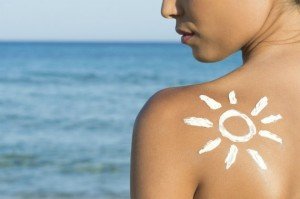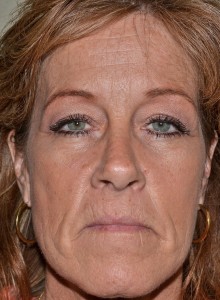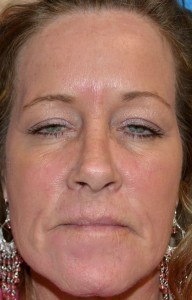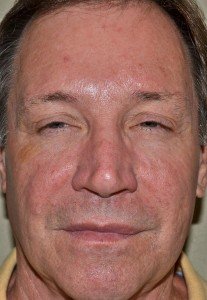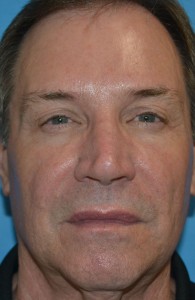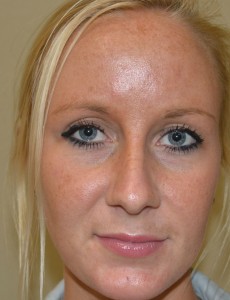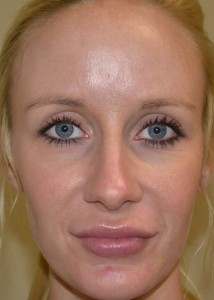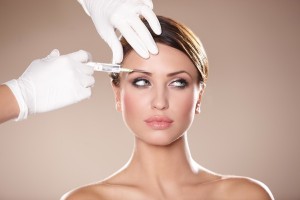Skin experts say that the best way to keep your skin healthy and looking young is to protect it from the sun and not smoke: and after that, taking care with how you wash, moisturize your skin and shave also help.
According to a British Association of Dermatologists survey carried out last year, many Britons are unaware that sun protection can keep the skin looking younger, believing instead that applying a daily moisturizer, eating a healthy diet, drinking plenty of water and having facial massages will suffice.Not only does exposure to UV increase a person’s risk of skin cancer, it also affects the elastin in the skin, which leads to wrinkles and sun-induced skin ageing such as leatheriness and blotchy pigmentation. Featured below are 5 tips for healthy skin:
Tip #1 for healthy skin: Sun protection
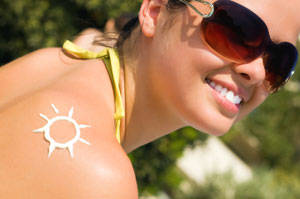
Ensure you protect your skin from the sun to maintain healthy skin
Most of the changes seen in ageing skin are actually “caused by a lifetime of sun exposure”.
To protect yourself from the sun, they advise the following three methods (with maximum protection coming from using all three).
- Avoid the sun during high intensity hours: the sun’s rays do the most damage between 10 am and 4 pm, so limit the time you spend outside during this period.
- Wear protective clothing: wear long sleeved shirts, long trousers or pants and a hat with a wide brim. Remember that tight woven fabric (eg denim) offers better protection than loosely woven fabrics like knits.
- Use sunscreen: go for a broad spectrum sunscreen with an SPF (sun protection factor) higher than 15 and apply generously about 20 minutes before you go out and then every two hours. You will need to apply more frequently if you go in the water or sweat a lot.
Tip #2 for healthy skin: Don’t smoke (and watch the alcohol)
Research shows that smoking alone ages skin. In a study published in the Archives of Dermatology, researchers described how they examined the upper inner arms of smokers and non-smokers aged from 22 to 91 and found that after taking into account age and other variables, the number of packs of cigarettes that the smokers smoked per day was significantly linked to skin ageing. They looked at the skin on the upper inner arms to minimize the influence of sun exposure.
Smoking reduces the skin’s natural elasticity by promoting the breakdown of collagen and also reducing the amount that is produced.
Collagen, a protein that helps skin strength, gradually degrades with age, leading to wrinkles. Smoking causes this to happen sooner and also causes the tiny blood vessels in the skin to tighten, which reduces the amount of oxygen and nutrients that the skin cells receive, which also reduces elasticity and accelerates ageing.
The Mayo Clinic also suggest that exposure to heat from burning cigarettes damages facial skin and that certain smoking behaviours contribute to wrinkles, because of the repetitive facial expressions that smokers make, such as pursing the lips on inhaling and squinting their eyes to keep the smoke out.
Drinking alcohol can make your body and skin dehydrated, leaving the skin looking old and tired. So if you are drinking alcohol drink plenty of water and stick to sensible amounts. Have a non-alcoholic drink like soda water or watery fruit juice in between the alcoholic ones to help your body rehydrate.
Tip #3 for healthy skin: Clean your skin regularly and apply moisturizer
A British Skin Foundation survey published in January 2008 found that an astonishing 50 per cent of people who wear make up in the UK are damaging their skin by not removing make up before they go to bed.
The reasons for not cleansing the skin of make up before going to bed were also revealing in that most people were too tired to take it off, suggesting they were not getting good quality sleep which also affects skin health. A significant proportion also said they had had too much to drink or simply couldn’t be bothered.
Cleansing is an important part of skin care because it removes dirt and bacteria; and the key is to do it gently.
Use warm rather than hot water and limit the time you spend in the bath or shower to 15 minutes or less as too much time in hot water strips oils from your skin.
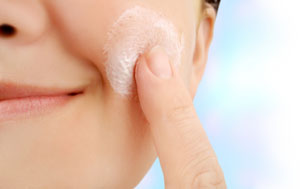
Moisturizing protects the skin from drying and acts as a protective layer for the skin
Also, use mild rather than strong soaps and avoid irritating additives such as perfumes and dyes, especially if you have sensitive skin.
When removing make up take care with the delicate skin around the eyes, and if you use waterproof make up you may need an oil-based product to make sure you get it all off.
When you have finished try to pat your skin dry so some moisture stays on it.
Moisturizing is important because it protects the skin from the weather and from drying up and looking dull. It helps your skin maintain its natural moisture levels too, say the Mayo Clinic experts, because it seals in the water already in the skin or slowly release water into the skin.
If you have dry skin avoid alcohol-based products and if you have oily skin avoid oil-based products (use water-based instead).
Some people with oily skin don’t need moisturizer: if your skin feels tight 20 minutes after bathing, then you probably do.
Tip #4 for healthy skin: Get enough quality sleep

Focus on quality sleep to keep your skin looking young and healthy
Sleep is essential for healthy skin. Not enough quality sleep will make your skin look tired and older, especially with bags under your eyes. Poor quality sleep can become a vicious cycle because lack of sleep makes you irritable, anxious and depressed, and that makes it harder to get good sleep.
Make sure you have plenty of physical exercise as this reduces stress and creates a healthy tiredness that helps sleep. Yoga and swimming are also good ways to improve sleep.
Aerobic exercise increases the oxygen circulating in your body which helps the skin stay vibrant and healthy.
Tip #5 for healthy skin: Shave with care
People shave to make their skin smooth and hairless, but this can irritate the skin, especially if it is thin, dry and sensitive.
For a smooth shave the Mayo Clinic experts advise that you shave after a warm bath or shower (or press a warm wet cloth on your skin) to soften the hair, don’t shave dry skin, use a clean, sharp razor, and shave in the direction of hair growth.
Make sure you rinse well afterwards with warm water to remove soap and dead cells.
If your skin is irritated after shaving don’t use an alcohol based lotion even if it feels cool, it will make the irritation worse because it dries the skin out.
Dr. Mark Bishara and The Paragon Plastis Surgery & Med Spa in Mansfield and Southlake, TX offers minimally invasive procedures, and skin care treatments to help keep your skin looking great. These treatments are designed to provide subtle enhancements that can improve your targeted problem areas, while allowing you to return to work and your regular activities the very same day. Dr. Bishara is also proud to offer a wide range of enhancing, minimally invasive procedures such as Botox, Xeomin, Juvederm Ultra Plus XC and Radiesse. Juvederm Voluma XC will be available soon. We will keep you updated or call our office for more information at (817) 473-2120.



